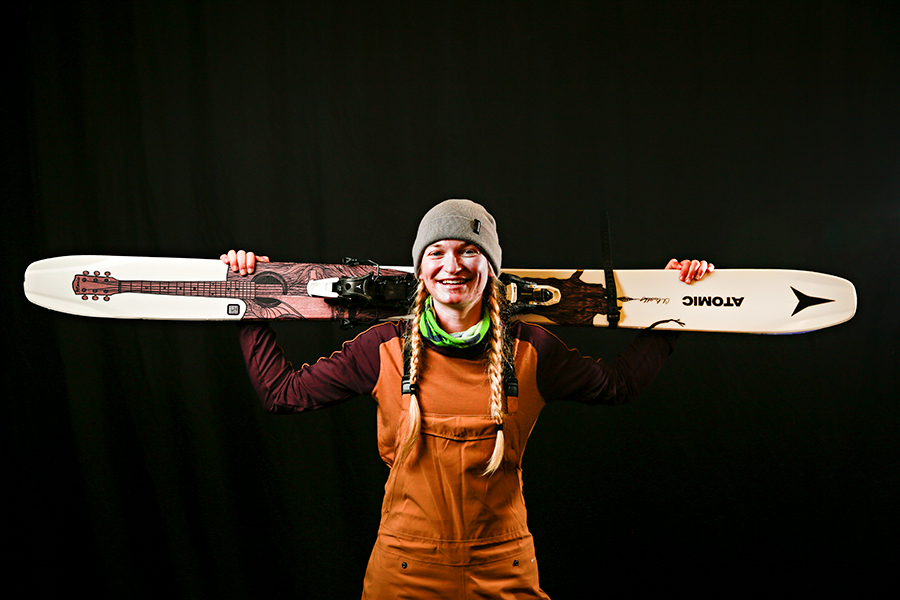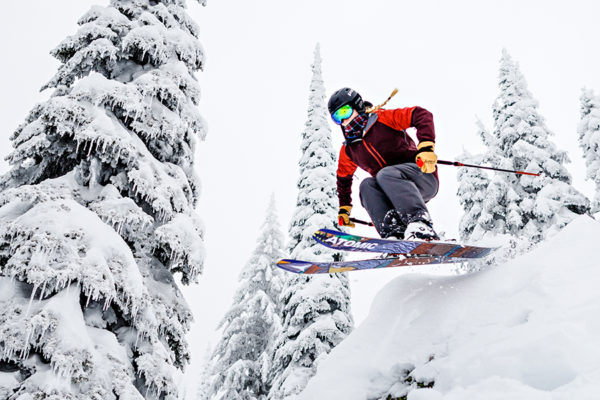The Recovery of a Racer Turned Mentor
After a career-ending concussion that had lingering effects for years, Erika Florian turned to coaching as a way to stay with the racing community
By Micah Drew
The Friday before Erika Florian was set to take her semester finals in the winter of 2016, she headed to the mountains to let off steam before settling in to a stressful week of studying. Florian, then a sophomore at St. Lawrence University, was a lifelong ski racer and a member of her school’s ski club. Taking to the snow was a natural escape.
On the last run of the day down Whiteface Mountain, Florian was skiing in the back of her group of friends when she hit a patch of soft snow, went down and smacked her head against the ground. She doesn’t remember getting back up, or telling a skier who saw her take the tumble that she’d hit her head really hard. She doesn’t remember waving that skier off when he told her to descend slowly down with him, or calling her dad while skiing straight down the mountain.
Florian’s next memory is of sitting at ski patrol with her boots off listening to a patroller ask her the requisite questions: When is your birthday? What day is it? Where do you go to school?
Unable to come up with answers, Florian broke down.
“I had a sharp brain and it was all foreign and scary to me,” Florian said.
Florian was diagnosed with a concussion and told that with a few days of dark rooms without screens she would be fine.
She wasn’t.
Florian started skiing at 2 years old. Her parents had met on their college ski team, and snow was more or less part of her genetic makeup.
“My parents never forced [my brother and I] into it,” Florian said. “We just got really good at it by the time we could decide whether we wanted to continue doing it.”
Growing up in Connecticut, Florian started racing in kindergarten and quickly progressed. When she and her brother outgrew the local competition, her family began renting a condo in New Hampshire and weekends turned into three-day racing affairs.
“I wasn’t as intense as the academy skiers, and the fact that I was doing so well pushed me to do more,” Florian said.
Eventually she joined the academy ranks, finishing high school at Proctor Academy where she got her first taste of international competition and set her sights on a competitive collegiate career.
Florian received two offers from Division I schools and decided to attend St. Lawrence, only to discover when she showed up on campus that the coach had given away the spot to another girl.
“It was super crushing for me, since that’s why I’d chosen the school,” Florian said. “But I decided my plan was to ski all the races and beat the St. Lawrence girls so I could earn a spot on the team.”
Unfortunately a low snow year canceled much of the racing season, and instead of trying to race full-time, Florian joined the club team and stayed on it her sophomore year.
“My identity as a ski racer, I needed that, and we were still able to race,” she said.
Since Florian’s accident occurred going into the holidays, she was able to postpone her finals until after the break, giving her a few weeks of recovery.
What started as a relatively normal recovery deteriorated when she tried studying for her genetics exam.
“It seemed like my brain had been replaced by another person’s,” Florian said.
As a double major in biology and chemistry, Florian was no stranger to long study sessions, but she found herself unable to retain much of the information. She ended up not taking the exam and received an incomplete in the class. She opted for a semester off from school to recover.
Florian says her memory of the months following the accident doesn’t become clear until around May, so she relies heavily on journals from that time to recall what happened.
While she has no memory of the first time she skied post accident, she knows it was in late January, while visiting an old ski team friend in Bozeman. For two days, Florian had no hesitancy getting back on the slopes.
“My brain was whacked out and skiing gave me a disgusting headache, but I did it anyway,” Florian said. “I just really wanted to get back on skis.”
After that trip, however, her ski season was done as her concussion symptoms persisted.
In the majority of concussion cases, patients return to normal functioning within two weeks, with only a fraction of cases leading to post-concussive symptoms lingering past a month. Florian was affected for six months.
Florian slept for around 16 hours every day. Her energy levels fluctuated drastically — getting dressed could be a chore — and her attempts at exercise were detrimental. A 10-minute walk caused a debilitating headache and left her bedridden all day.
“It felt like my brain was too big for my head any time I exercised,” Florian said. “As a dedicated athlete, these were the worst months of my life.”
The whole semester off was spent with physical therapists, occupational therapists, speech therapists and endless doctor appointments.
“I was given basic things like coloring books and crossword puzzles, and I felt stupid all the time because they were so hard,” Florian said. “They were trying to get me back to the point where I could be a functioning human, let alone an athlete.”

When Florian decided to return to school in the fall of 2017, she didn’t go back to St. Lawrence, instead opting to transfer to Montana State University.
She was back on the slopes that winter, even as she continued her recovery. A day of skiing left her feeling foggy, akin to downing a few beers, meaning any homework she needed to do had to be finished before the first chair.
“You’re fully immersed in the moment, constantly thinking when you’re skiing, looking at the terrain and moving quick on your feet,” she said. “Maybe my brain was tired from that.”
Instead of pursuing top-level racing again, Florian started coaching the ski team at Big Sky Resort, realizing it was the ultimate way to give back to her sport.
“Coaching allows me to pass on information I’ve accumulated throughout my whole life that I’ve been keeping inside my brain,” Florian said. “And I’m obsessed with mentoring kids. Any kid that approaches me with a question, I will just give them all my knowledge.”
Florian, now a nursing student at MSU’s Kalispell campus, immediately applied to coach at Big Mountain when she found out her nursing school placement, despite never having skied at Whitefish Mountain Resort before.
“It’s awesome being able to help other kids progress to be good skiers in whatever way they want to,” she said. “Most kids here will race for a few years, then get on the freestyle team or do big mountain stuff. I just want to contribute to their ski career in any way I can.”
Four years after her accident, Florian still notices some lingering effects. Her learning styles have shifted, forcing her to adopt new strategies in the classroom, and she finds that if her brain isn’t constantly stimulated — through physical activity, conversations or podcasts — she slips into a “boggy area,” as if her brain shifts into neutral when idling.
On the mountain, her confidence to cut it loose it is still creeping back.
“It’s taken up to this point to get over the hurdle of being scared of getting that severe of a concussion again,” Florian said. “Just this weekend I hit a cliff, like 15 feet tall, and it felt easy for the first time — I did it with comfort.”
“Skiing is the way I feel alive, it’s my favorite thing to do,” Florian continued. “Part of it is skiing around these little groms who are killing it and they make me want to push myself.”
Erika Florian also talks about her experiences dealing with concussion recovery on an episode of the Sideline Perspective podcast.